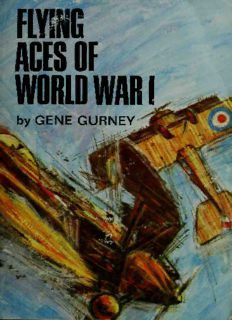
Flying Aces of World War I PDF
Preview Flying Aces of World War I
HYiNG ACBiOF WORLD WAR I GENE GURNEY by s. :""^: \ .\ .% <-^^'.'' y> Vi' FLYING ACES OF WORll WAR I by Gene Gumey Illustrated with photographs J™I^0SCHOLASTIC BOOK SERVICES N«WYORK.TORONTO•LONDON•AUCKLAND•SYOtttV•TOKYO To Clare All photographs in this book are from the United States Air Force with the exception of the following: Bettmann Archive, pp. 4, 12, 27, 37 (top), 59; Lt. Col. Kimhrough S. Brown, pp. 20, 62, 121, 127; Culver Pictures, pp. 7 (left), 25, 30, 56; The Daily News, p. 146; European Picture Service, p. 17; The Granger Collection, p. 7 (right); Imperial War Museum, pp. 71, 74, 76, 105, 118; National Archives/Army Air Forces, pp. 45, 110, 161; NationalArchives/U. S. Navy, pp. 133, 135; Na- tional Archives/U. S. Signal Corps, p. 115; Robert Soubiran (through USAF), title page, pp. 37 (bottom), 95, 119; United Press International, p. 109. Cover Painting: Francis A. Chauncy Noportofthispublicationmaybereproducedinwholeorinport, orstoredinaretrieval system,ortransmittedinanyformorbyanymeans,electronic, mechanical,photocopying, recording, or otherwise, without written permission of the publisher. For information regarding permission, write to Random House, Inc., 201 East 50th Street, New York, N.Y. 10022. ISBN 0-590-30388-0 © Copyright 1965 by Gene Gurney. All rights reserved. This edition is published by Scholastic Book Servkes, a division of Schobstic Inc., 730 Broadway, New York, NY 10003, by arrangement with Random House, Inc. 12 11 10 9 8 7 3 4 5 6 7/8 Printed In the U.S.A. 11 CONTENTS The Airplane Goes to War 3 Georges Guynemer of the Storks 22 The Invincible Albert Ball 40 Manfred von Richthofen and His Flying Circus 57 Raoul Lufbery and the Escadrille Lafayette jj Edward Mannock, Britain's Leading Ace 100 Willy Coppens, Fighter for Belgium 114 Dave Ingalls, Navy Ace 131 Eddie Rickenbacker Throws His Hat into the Ring 148 Record of Planes Downed by World War Aces I 173 Bibliography 177 Index 181 MAP OF THE W^ESTERN FRONT 10 ::kh:':s-^H^.: THE AIRPLANE WAR GOES TO The immediate cause of World War I was an assas- sin's bullets. The fateful shots were fired in Sarajevo, the capital of the Austro-Hungarian province of Bosnia, on June 28, 1914. On that day the heir to the throne of Austria-Hungary, Francis Ferdinand, who was in Sarajevo to observe the summer maneuvers of the Austrian army, went for a ride through the city in an open motor car. His consort, the Duchess of Hohenberg, accompanied him. As the couple traveled through the sunlit streets of Sarajevo, a young man named Gavrilo Princip quietly joined a group of people who were waiting for a glimpse of the Arch- duke. When the royal entourage approached the spot where Princip stood, the young Bosnian stepped for- ward, aimed a pistol at the Archduke, and fired. At the sound of the shots the horses in the pro- cession neighed and reared in fright. The Archduke Archduke Francis Ferdinand with his wife approximately one hour before their assassination. grasped his throat and fell forward; the Duchess collapsed against him. In an instant the soldiers accompanying Francis Ferdinand had wheeled their mounts and surrounded Princip. It was too late to do anything for the Archduke. Both he and his consort had been fatally wounded. Why did Gavrilo Princip shoot the man who some- day would have been the ruler of the great Austro- Hungarian Empire? The reason was political. Like many of his fellow Bosnians, Princip wanted his coun- try to be independent. "Why should we be ruled by officials in faraway Vienna?" he asked.
